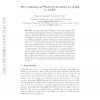Free Online Productivity Tools
i2Speak
i2Symbol
i2OCR
iTex2Img
iWeb2Print
iWeb2Shot
i2Type
iPdf2Split
iPdf2Merge
i2Bopomofo
i2Arabic
i2Style
i2Image
i2PDF
iLatex2Rtf
Sci2ools
146
click to vote
SAGT
2015
Springer
2015
Springer
The Combinatorial World (of Auctions) According to GARP
Revealed preference techniques are used to test whether a data set is compatible with rational behaviour. They are also incorporated as constraints in mechanism design to encourage truthful behaviour in applications such as combinatorial auctions. In the auction setting, we present an efficient combinatorial algorithm to find a virtual valuation function with the optimal (additive) rationality guarantee. Moreover, we show that there exists such a valuation function that both is individually rational and is minimum (that is, it is component-wise dominated by any other individually rational, virtual valuation function that approximately fits the data). Similarly, given upper bound constraints on the valuation function, we show how to fit the maximum virtual valuation function with the optimal additive rationality guarantee. In practice, revealed preference bidding constraints are very demanding. We explain how approximate rationality can be used to create relaxed revealed preference c...
Game Theory | SAGT 2015 |
| Added | 17 Apr 2016 |
| Updated | 17 Apr 2016 |
| Type | Journal |
| Year | 2015 |
| Where | SAGT |
| Authors | Shant Boodaghians, Adrian Vetta |
Comments (0)

